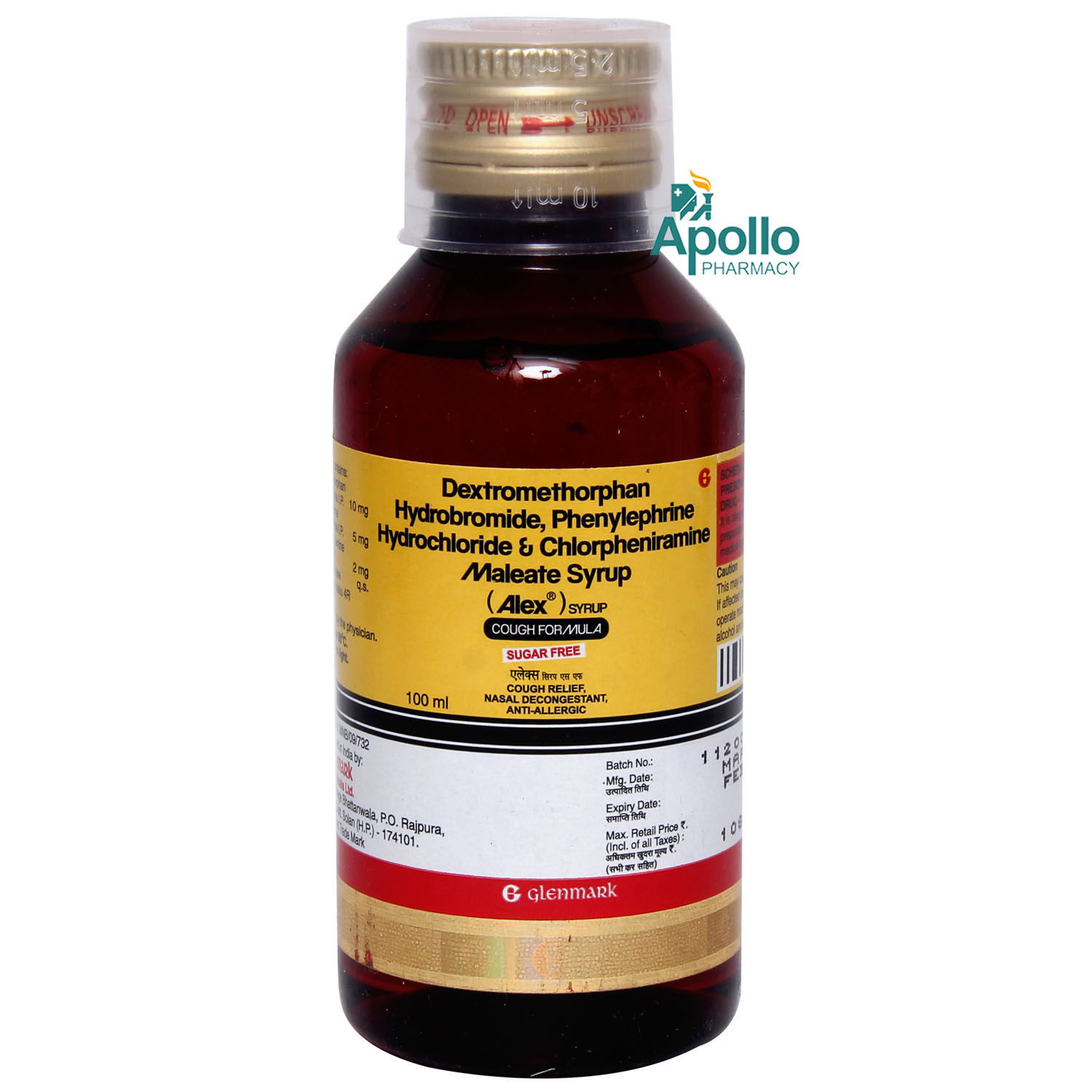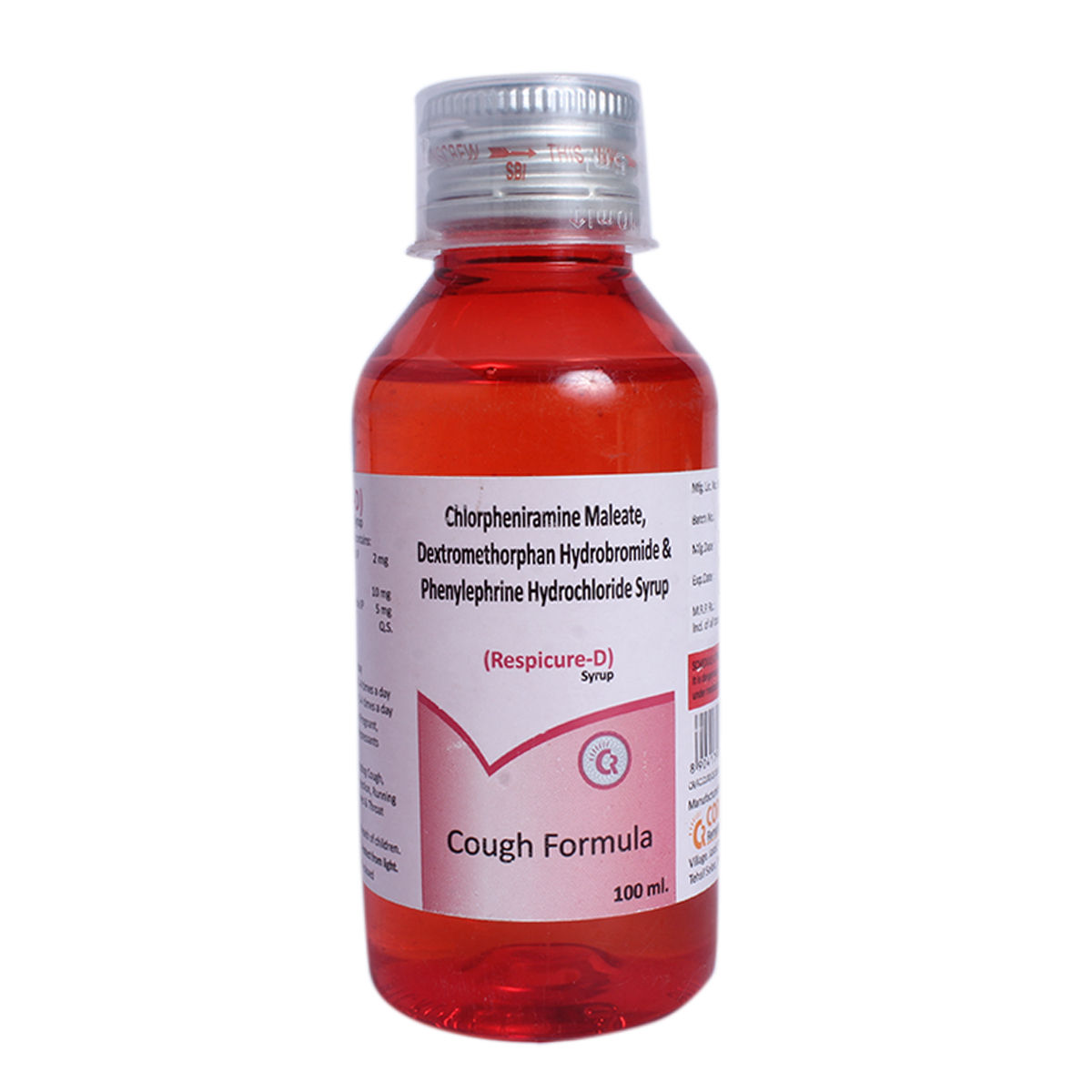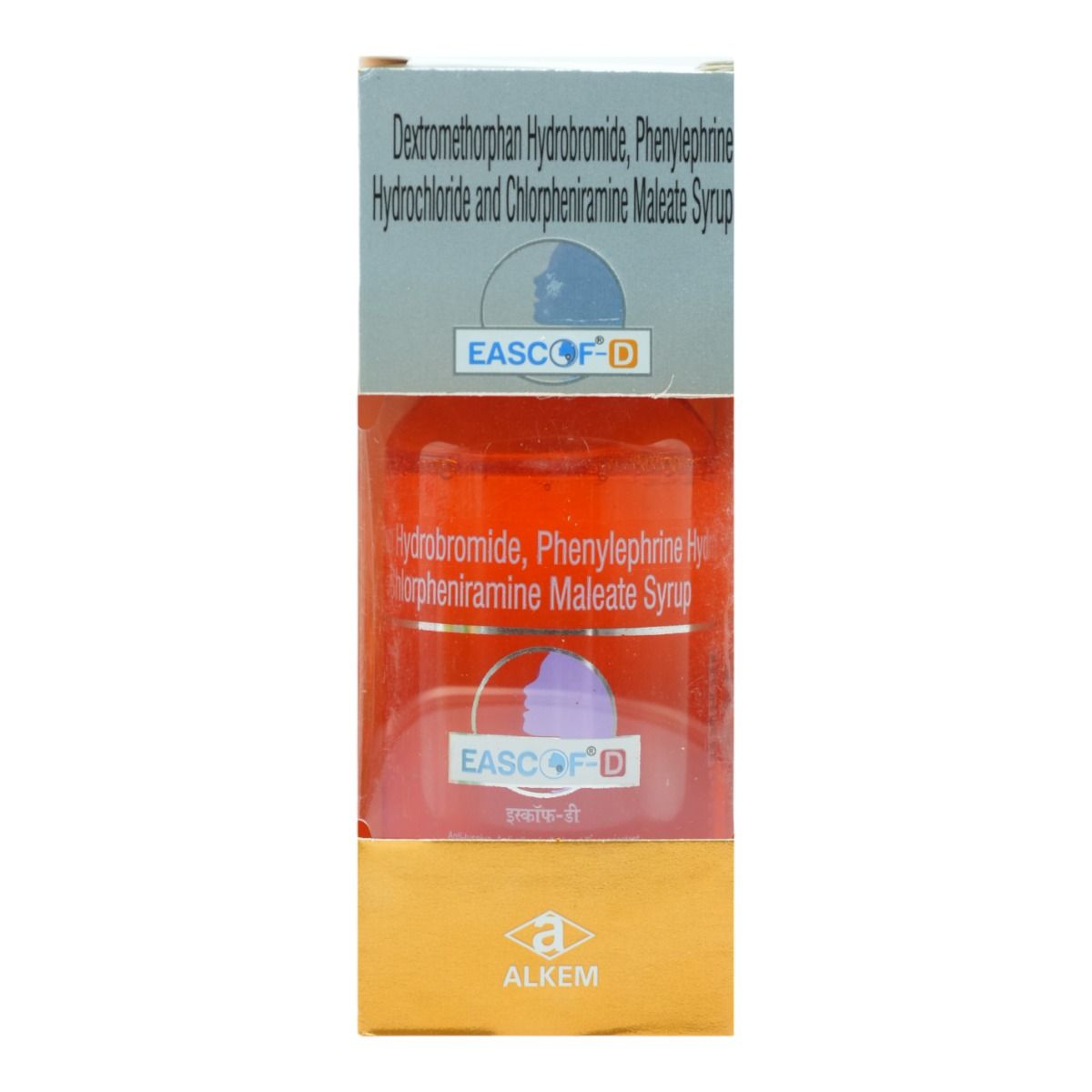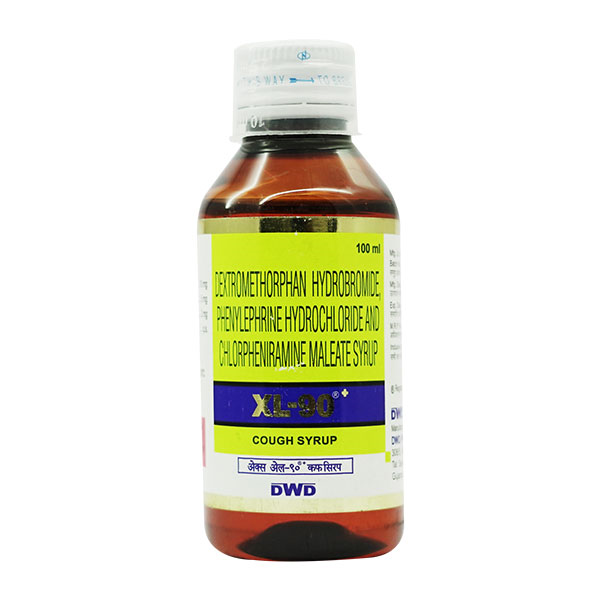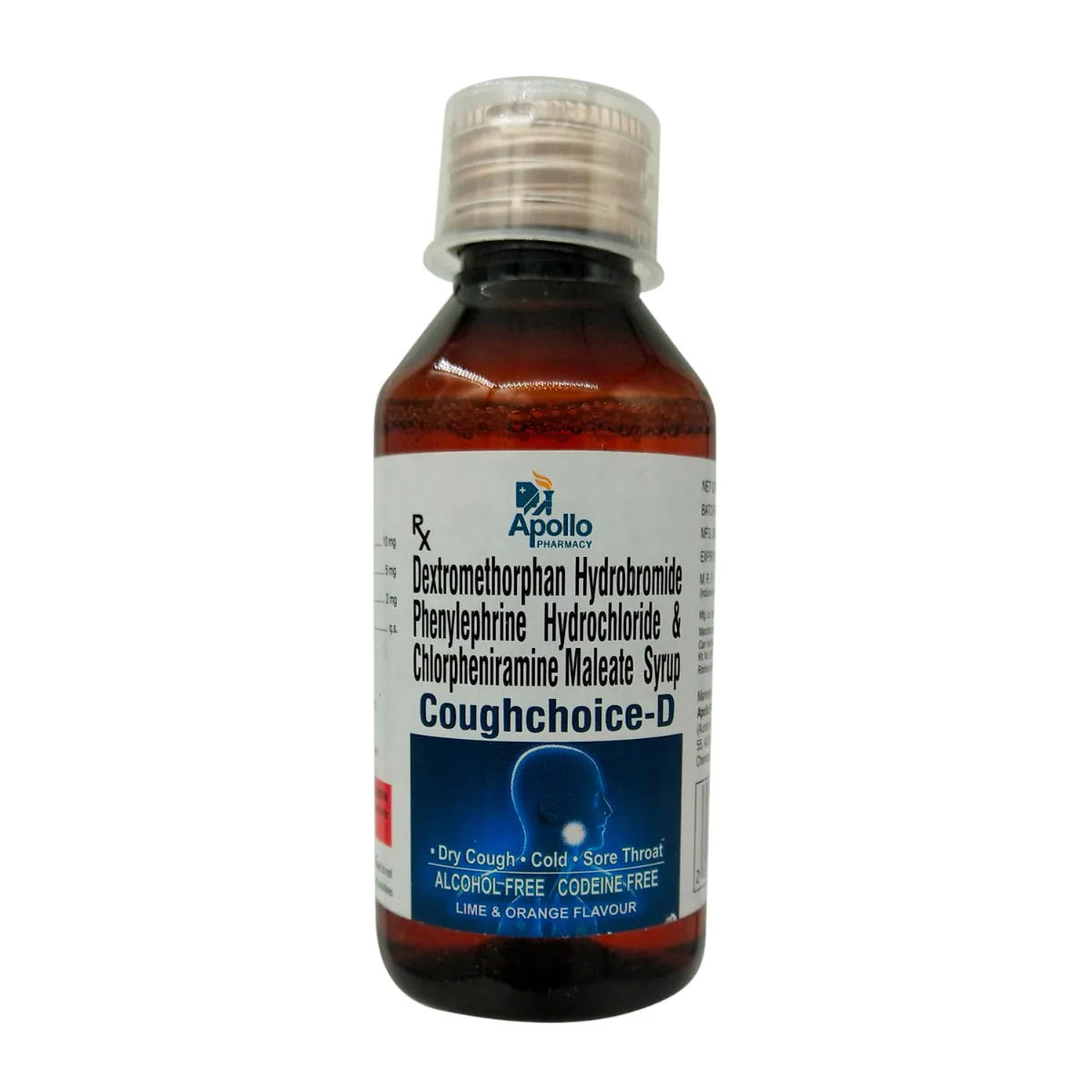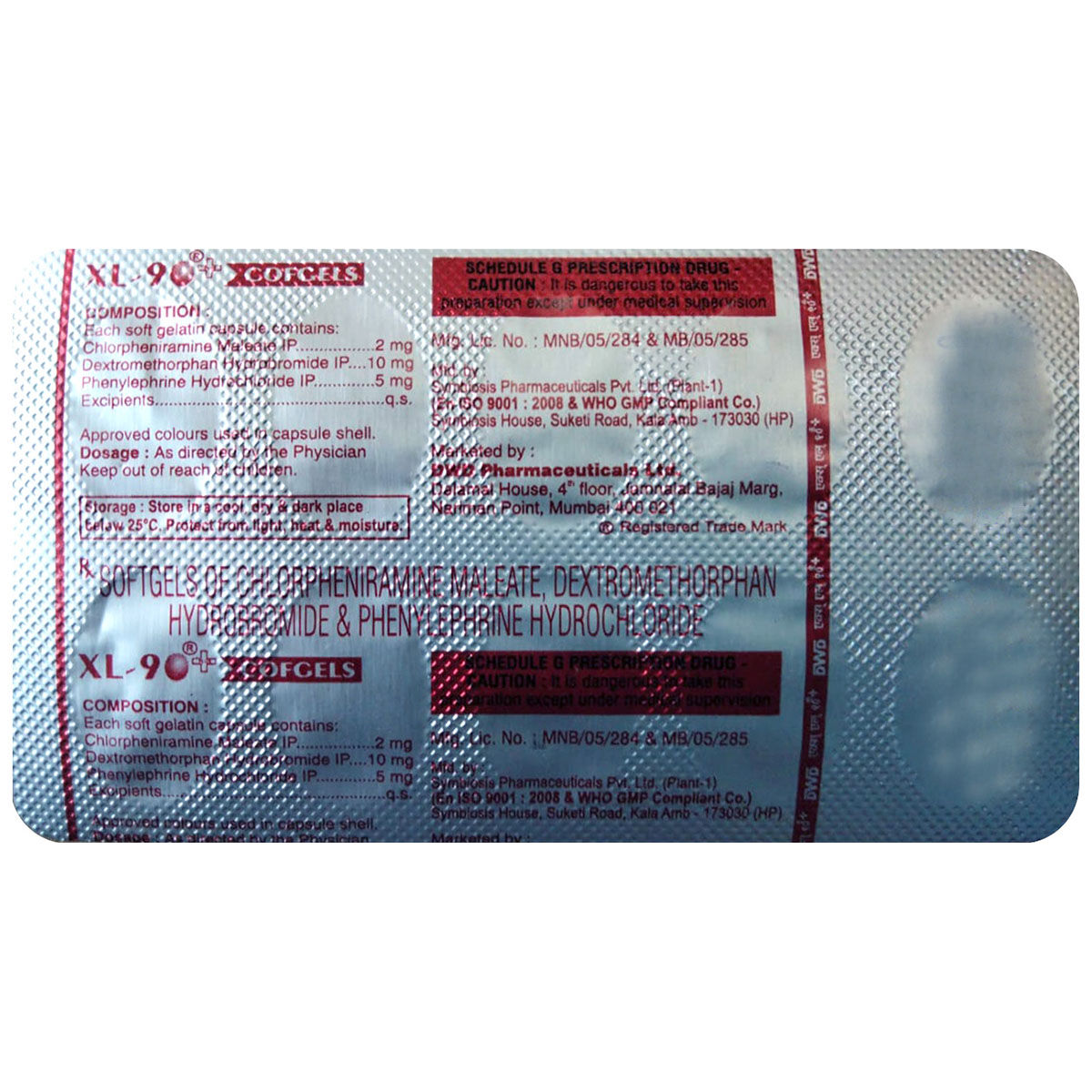Dpc Cough Syrup 100 ml
Dpc Cough Syrup is a combination medicine that belongs to the expectorant class. It is used to treat dry cough. This medicine works by preventing nerve signals from the brain's cough centre from reaching the muscles that cause coughing and thus reducing cough. You may experience common side effects like headache, dizziness, numbness, drowsiness, or nausea.
₹70.2*
MRP ₹78
10% off
₹66.3*
MRP ₹78
15% CB
₹11.7 cashback(15%)
Free Delivery
With Circle membership
(Inclusive of all Taxes)
This offer price is valid on orders above ₹800. Apply coupon PHARMA10/PHARMA18 (excluding restricted items)
Know Your Delivery Time
Provide Delivery Location

Available Offers
 Prescription drug
Prescription drugWhats That

Secure Payment

India's Most Trusted Pharmacy

Genuine Products
Manufacturer/Marketer :
Consume Type :
Return Policy :
Expires on or after :
About Dpc Cough Syrup
Dpc Cough Syrup is used to treat dry cough. Coughing (dry or productive) is the body's way of clearing irritants (like allergens, mucus, or smoke) from airways and preventing infection. There are two types of coughs: dry cough and chesty cough. A dry cough is tickly and doesn't produce any vicious or thick mucus, while a chesty cough (wet cough) means mucous or sputum is produced to help clear the airways.
Dpc Cough Syrup is a combination of three drugs: Chlorpheniramine maleate (antihistamine), Phenylephrine hydrochloride (decongestant), and Dextromethorphan hydrobromide (cough suppressant). Chlorpheniramine maleate works by blocking the action of histamine, a substance responsible for causing allergic reactions. Phenylephrine hydrochloride helps in shrinking the blood vessels located in the nasal passage, thereby reducing the stuffy nose. Dextromethorphan hydrobromide works by blocking the transmission of nerve signals from the cough centre in the brain to the muscles that produce cough. Together, it helps to provide relief from dry cough.
Take Dpc Cough Syrup as prescribed. Your doctor will recommend how often you need to take Dpc Cough Syrup based on your medical condition. Some people may experience dry mouth, throat, or nose, drowsiness, blurred vision, constipation, dizziness, restlessness, or excitation. Most of these side effects of Dpc Cough Syrup do not require medical attention and gradually resolve over time. However, if the side effects persist or worsen, please consult your doctor.
If you are pregnant or breastfeeding, it is advised to inform your doctor before using Dpc Cough Syrup . If you are about to undergo any medical tests or surgery, please inform your doctor that you are taking Dpc Cough Syrup . Avoid using Dpc Cough Syrup if you have taken monoamine oxidase inhibitors in the past 14 days. If you have glaucoma, urinary problems, enlarged prostate, phenylketonuria (a congenital disability that causes accumulation of amino acid, phenylalanine in the body), cough with mucus or cough caused by asthma, smoking, chronic bronchitis or emphysema (a lung condition causing shortness of breath), inform your doctor before taking Dpc Cough Syrup .
Uses of Dpc Cough Syrup
Directions for Use
Medicinal Benefits
Dpc Cough Syrup is a combination of three drugs: Chlorpheniramine maleate, Phenylephrine hydrochloride, and Dextromethorphan hydrobromide. Dpc Cough Syrup is a combination medicine belonging to a class of drugs called 'cough and cold preparations' primarily used to treat dry cough. Chlorpheniramine maleate works by blocking the action of histamine, a substance responsible for causing allergic reactions. It helps provide relief from allergy symptoms such as sneezing, running nose, watery eyes, itching, swelling, congestion or stiffness. Phenylephrine hydrochloride is a decongestant that helps in shrinking the blood vessels located in the nasal passage, thereby reducing the stuffy nose. Dextromethorphan hydrobromide works by blocking the transmission of nerve signals from the cough centre in the brain to the muscles that produce cough. Thus, Dpc Cough Syrup helps to relieve cough, cold and allergic symptoms.
How Dpc Cough Syrup Works
Storage
Side Effects of Dpc Cough Syrup
- Dry mouth, throat or nose
- Drowsiness
- Dizziness
- Blurred vision
- Headache
- Constipation
- Restlessness or excitation
- Loss of appetite
What if I have taken an overdose of Dpc Cough Syrup
Drug Warnings
If you are allergic to Dpc Cough Syrup or any other medicines, please tell your doctor. If you are pregnant or breastfeeding, it is advised to inform your doctor before using Dpc Cough Syrup . Dpc Cough Syrup is not recommended for children below 12 years of age. If you are about to undergo any medical tests or surgery, please inform your doctor that you are taking Dpc Cough Syrup . Avoid taking Dpc Cough Syrup if you have taken medicines such as linezolid, phenelzine, selegiline, rasagiline, isocarboxazid, tranylcypromine and methylene blue injection in the past 14 days. If you have glaucoma, urinary problems, enlarged prostate, phenylketonuria (a birth defect that causes accumulation of amino acid, phenylalanine in the body), cough with mucus or cough caused by asthma, smoking, chronic bronchitis or emphysema (a lung condition causing shortness of breath), inform your doctor before taking Dpc Cough Syrup .
Drug-Drug Interactions
Drug-Drug Interactions
Login/Sign Up
Taking Tranylcypromine with Dpc Cough Syrup 100 ml can increase the risk of serotonin syndrome (a condition in which a chemical called serotonin increases in your body).
How to manage the interaction:
Taking Dpc Cough Syrup 100 ml with Tranylcypromine is not recommended, but can be taken together if prescribed by a doctor. However, consult a doctor if you experience confusion, hallucination(seeing and hearing things that do not exist), fit blood pressure alteration, increased heart rate, fever, excessive sweating, shivering or shaking, blurred vision, pain in the muscles or stiffness, incoordination, stomach cramps, nausea, vomiting, and diarrhea. Do not discontinue any medications without consulting a doctor.
Co-administration of Pargyline and Dpc Cough Syrup 100 ml can increase the risk of serotonin syndrome (A condition in which a chemical called serotonin builds up in your body).
How to manage the interaction:
Co-administration of Dpc Cough Syrup 100 ml and Pargyline can lead to an interaction. However, if you experience any symptoms like confusion, hallucination, seizure, changes in blood pressure, increased heart rate, fever, excessive sweating, shivering or shaking, blurred vision, muscle stiffness, tremors, stomach cramps, nausea, vomiting, and diarrhea, consult a doctor immediately. Do not stop using any medications without a doctor's advice.
Co-administration of Dpc Cough Syrup 100 ml and Selegiline may increase the risk of serotonin syndrome (a condition in which a chemical called serotonin builds up in your body).
How to manage the interaction:
Co-administration of Selegiline with Dpc Cough Syrup 100 ml can possibly result in an interaction, but it can be taken if a doctor has advised it. If you notice any of these symptoms - confusion, hallucination, fits, increased heart rate, fever, excessive sweating, shivering, shaking, blurred vision, muscle spasm, stiffness, incoordination, stomach cramps, nausea, vomiting, or diarrhea - make sure to contact a doctor right away. Do not stop using any medications without talking to a doctor.
Taking Rasagiline with Dpc Cough Syrup 100 ml can increase the risk of serotonin syndrome (A condition in which a chemical called serotonin increase in your body).
How to manage the interaction:
Taking Dpc Cough Syrup 100 ml with Rasagiline is not recommended as it can possibly result in an interaction, it can be taken if a doctor has advised it. If you notice any of these symptoms like confusion, hallucination, fits, extreme changes in blood pressure, increased heart rate, fever, excessive sweating, shivering or shaking, blurred vision, muscle spasm or stiffness, shaking, incoordination, stomach cramps, nausea, vomiting, and diarrhea, consult a doctor. Do not discontinue any medications without consulting a doctor.
Co-administration of Dpc Cough Syrup 100 ml and Procarbazine may increase the risk of serotonin syndrome (a condition in which a chemical called serotonin builds up in your body).
How to manage the interaction:
Co-administration of Procarbazine with Dpc Cough Syrup 100 ml can possibly result in an interaction, but it can be taken if a doctor has advised it. If you notice any of these symptoms - confusion, hallucination, seizure, increased heart rate, fever, excessive sweating, shivering, shaking, blurred vision, muscle spasm, stiffness, incoordination, stomach cramps, nausea, vomiting, or diarrhea - make sure to contact a doctor right away. Do not stop using any medications without talking to a doctor.
Co-administration of Isocarboxazid with Dpc Cough Syrup 100 ml can increase the risk of serotonin syndrome (A condition in which a chemical called serotonin builds up in your body).
How to manage the interaction:
Taking Dpc Cough Syrup 100 ml and Isocarboxazid can lead to an interaction. However, if you experience any symptoms like confusion, hallucination, seizure, changes in blood pressure, increased heart rate, fever, excessive sweating, shivering or shaking, blurred vision, muscle stiffness, tremors, stomach cramps, nausea, vomiting, and diarrhea, consult a doctor immediately. Do not stop using any medications without a doctor's advice.
Co-administration of Phenelzine and Dpc Cough Syrup 100 ml can increase the risk of serotonin syndrome (A condition in which a chemical called serotonin builds up in your body).
How to manage the interaction:
Co-administration of Phenelzine and Dpc Cough Syrup 100 ml can lead to an interaction. However, if you experience any symptoms like confusion, hallucination, seizure, changes in blood pressure, increased heart rate, fever, excessive sweating, shivering or shaking, blurred vision, muscle stiffness, tremors, stomach cramps, nausea, vomiting, and diarrhea, consult a doctor immediately. Do not stop using any medications without a doctor's advice.
Taking Dpc Cough Syrup 100 ml and Potassium citrate (in tablet or capsule form) together can increase the risk of stomach ulcers, bleeding, and gastrointestinal injury.
How to manage the interaction:
Taking Dpc Cough Syrup 100 ml with Potassium citrate is not recommended as it can lead to an interaction, it can be taken if prescribed by the doctor. However, if you experience any symptoms such as severe stomach pain, bloating, lightheadedness or dizziness, nausea, vomiting (especially with blood), decreased hunger, or dark, tarry stools, consult the doctor immediately. Do not discontinue any medications without a doctor's advice.
Taking Dpc Cough Syrup 100 ml and Potassium chloride (in tablet or capsule form) together can increase the risk of stomach ulcers, bleeding, and gastrointestinal injury.
How to manage the interaction:
Taking Dpc Cough Syrup 100 ml with Potassium chloride it not recommended as it can lead to an interaction, it can be taken if your doctor has prescribed it. However, if you experience any symptoms such as severe stomach pain, bloating, lightheadedness or dizziness, nausea, vomiting (especially with blood), decreased hunger, or dark, tarry stools, consult the doctor. Do not discontinue any medications without a doctor's advice.
Taking Furazolidone with Dpc Cough Syrup 100 ml can cause an increase in high blood pressure.
How to manage the interaction:
Taking Furazolidone with Dpc Cough Syrup 100 ml is not recommended, it can be taken if prescribed by the doctor. However, if you experience sudden and severe headache, blurred vision, confusion, seizures, chest pain, nausea or vomiting, sweating, lightheadedness, fainting, sudden numbness or weakness (especially on one side of the body), speech difficulties, fever, consult the doctor immediately. It is advised to use Dpc Cough Syrup 100 ml only after 14 days of stopping Furazolidone.
Drug-Food Interactions
Drug-Food Interactions
Login/Sign Up
Diet & Lifestyle Advise
- Avoid dairy products such as milk, as it may increase mucus production. Also, avoid processed or refined foods.
- Drink plenty of fluids to avoid a dry throat while you have a cough. This will also help loosen mucus.
- Avoid citrus fruits, as they may worsen the cough. Eat fruits rich in water, such as pears, watermelon, peaches, and pineapples.
Habit Forming
Therapeutic Class
Dpc Cough Syrup Substitute

Alex Sugar Free Syrup 100 ml
₹1.39per tabletRespicure D Syrup 100 ml
by AYUR
₹1.03per tabletAlkof Junior Syrup 100 ml
₹1.06per tabletEascof-D Sugar Free Mixed Fruit Syrup 100 ml
by AYUR
₹1.08per tabletXL-90 Plus Cough Syrup 100 ml
by XL9
₹1.08per tablet
Product Substitutes
Alcohol
Caution
Avoid consumption of alcohol with Dpc Cough Syrup as it may increase drowsiness. Please consult a doctor before consuming alcohol with Dpc Cough Syrup .
Pregnancy
Caution
The safety of Dpc Cough Syrup in pregnant women is unknown. Consult your doctor if you have any concerns; your doctor will prescribe only if the benefits outweigh the risks.
Breast Feeding
Caution
It is unknown whether Dpc Cough Syrup is excreted in human milk. Consult your doctor if you have any concerns; your doctor will decide if Dpc Cough Syrup can be taken by breastfeeding mothers or not.
Driving
Caution
Dpc Cough Syrup may cause dizziness or drowsiness in some people. Therefore, drive only if you are alert after taking Dpc Cough Syrup .
Liver
Caution
Take Dpc Cough Syrup with caution, especially if you have a history of liver disease. The dose may be adjusted by your doctor as required.
Kidney
Caution
Take Dpc Cough Syrup with caution, especially if you have a history of kidney disease. The dose may be adjusted by your doctor as required.
Children
Caution
Dpc Cough Syrup is not recommended for children below 12 years of age. However, please consult a doctor before using Dpc Cough Syrup in children.
FAQs
Country of origin
Manufacturer/Marketer address
Disclaimer
Author Details
We provide you with authentic, trustworthy and relevant information
Reference
- https://www.drugs.com/mtm/chlorpheniramine-dextromethorphan-and-phenylephrine.html#:~:text=Chlorpheniramine%20is%20an%20antihistamine.,common%20cold%2C%20or%20the%20flu.
- https://www.drugs.com/mtm/chlorpheniramine-and-dextromethorphan.html
- https://www.nhs.uk/medicines/chlorphenamine-including-piriton/
- https://www.medicines.org.uk/emc/files/pil.11927.pdf






